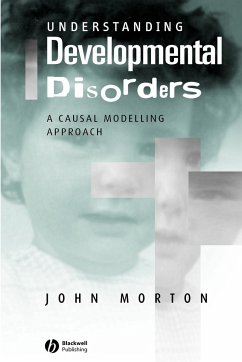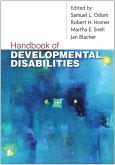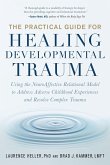A long--awaited book from developmental disorders expert John Morton, Understanding Developmental Disorders: A Causal Modelling Approach makes sense of the many competing theories about what can go wrong with early brain development, causing a child to develop outside the normal range.
Hinweis: Dieser Artikel kann nur an eine deutsche Lieferadresse ausgeliefert werden.
Hinweis: Dieser Artikel kann nur an eine deutsche Lieferadresse ausgeliefert werden.
"What causes disorders of development? How can they be meaningfullydefined? These questions have resulted in deeply entangledcontroversies. John Morton has provided a razor-sharp tool thatcuts the Gordian knot. This tool uses a simple pictorial notationthat leaves aside ambiguous and divisive words. It resolvesentrenched but illusory oppositions between cognition and brain andbetween nature and nurture. It makes the confusing facts aboutautism, dyslexia, and other disorders fall into a new coherentpattern and invigorates the comparison of different points of view.This book is indispensable for anyone trying to understandcognitive development and its disorders." Uta Frith, Professorof Cognitive Development, University College LondonInstitute of Cognitive Neuroscience
"In his compelling book, Understanding DevelopmentalDisorders, John Morton applies a causal modeling approach tounderstanding the influences that biological, cognitive,behavioral, and environmental factors exert on the emergence ofdevelopmental disorders. Morton eloquently conveys a way ofconceptualizing various theories of developmental disorders. Thisvolume will provide an invaluable tool for students, practitioners,and those in academia. I highly recommend it as a must for allprofessionals striving to understand the origins and course ofdevelopmental disorders." Dante Cicchetti, Ph.D., Director, Mt.Hope Family Center
"Causal modelling of cognition is a new and original tool notonly for thinking with precision about cognitive development andthe ways in which it can go amiss; I can see this book having arevolutionary impact on developmental psychology. Thecausal-modelling framework is also valuable for exposing the kindof sloppy thinking about the causes of developmental difficultiesthat one sees so often in statements by journalists and politicians(the book contains many such examples). Simply and cogentlywritten, this book is of great importance both for scientists indevelopmental psychology and for public-health professionalsconcerned with disorders such as autism, ADHD and dyslexia."Prof Max Coltheart, Scientific Director, Macquarie Centre forCognitive Science, Australia
"John Morton's deep and wonderful book should be requiredreading for any serious student of cognitive development, as wellas for any researcher concerned with developmental disabilities. Ingiving us a tool for thinking about the causal history ofdevelopmental disabilities, he offers profound insights into thenature of causality, the relations among different levels ofanalysis, and the causes of four developmental syndromes, includingautism and dyslexia." Susan Carey, Professor, HarvardUniversity
"Morton's lucid and highly readable book offers an excellenttool to clarify the field of developmental disorders as it standsand to point the way to the future." Trends in CognitiveSciences, August 2005
"Morton writes from first principles but then, as the bookprogresses, assumes some psychological sophistication. He has acomfortable and conversational...style that has become unusual inscientific writing. It invites reflection, questioning anddiscussion and I found it well suited to putting across concepts."Tom Berney, Journal of Child Psychology and Psychiatry, May2006
"Morton's causal modeling approach seems aninnovative and insightful advance in examining and understandingthe causes and diagnosis of pathologic conditions."Psychological Record
"In his compelling book, Understanding DevelopmentalDisorders, John Morton applies a causal modeling approach tounderstanding the influences that biological, cognitive,behavioral, and environmental factors exert on the emergence ofdevelopmental disorders. Morton eloquently conveys a way ofconceptualizing various theories of developmental disorders. Thisvolume will provide an invaluable tool for students, practitioners,and those in academia. I highly recommend it as a must for allprofessionals striving to understand the origins and course ofdevelopmental disorders." Dante Cicchetti, Ph.D., Director, Mt.Hope Family Center
"Causal modelling of cognition is a new and original tool notonly for thinking with precision about cognitive development andthe ways in which it can go amiss; I can see this book having arevolutionary impact on developmental psychology. Thecausal-modelling framework is also valuable for exposing the kindof sloppy thinking about the causes of developmental difficultiesthat one sees so often in statements by journalists and politicians(the book contains many such examples). Simply and cogentlywritten, this book is of great importance both for scientists indevelopmental psychology and for public-health professionalsconcerned with disorders such as autism, ADHD and dyslexia."Prof Max Coltheart, Scientific Director, Macquarie Centre forCognitive Science, Australia
"John Morton's deep and wonderful book should be requiredreading for any serious student of cognitive development, as wellas for any researcher concerned with developmental disabilities. Ingiving us a tool for thinking about the causal history ofdevelopmental disabilities, he offers profound insights into thenature of causality, the relations among different levels ofanalysis, and the causes of four developmental syndromes, includingautism and dyslexia." Susan Carey, Professor, HarvardUniversity
"Morton's lucid and highly readable book offers an excellenttool to clarify the field of developmental disorders as it standsand to point the way to the future." Trends in CognitiveSciences, August 2005
"Morton writes from first principles but then, as the bookprogresses, assumes some psychological sophistication. He has acomfortable and conversational...style that has become unusual inscientific writing. It invites reflection, questioning anddiscussion and I found it well suited to putting across concepts."Tom Berney, Journal of Child Psychology and Psychiatry, May2006
"Morton's causal modeling approach seems aninnovative and insightful advance in examining and understandingthe causes and diagnosis of pathologic conditions."Psychological Record








